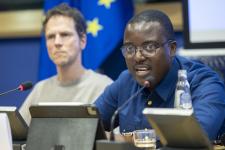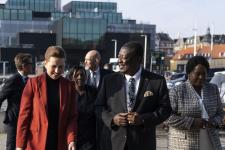Development and climate finance

Global/Megatrends
A consensus is emerging that the current global financial architecture (GFA) is failing and requires reforms. Primarily targeted at the Bretton Woods institutions (specifically the World Bank and IMF), this call for reforms extends to other new MDBs and DFIs fashioned after the Bretton Woods institutions. These institutions have failed notably during crises like the recent COVID-19 pandemic, failing to provide safety nets, particularly to lower-income countries whose leaders now strongly think the system needs an overhaul. The prevailing perception paints the system as outdated, dysfunctional, and unjust. Notably, once sidelined during their inception, principles such as inclusivity, justice, and equality are now imperatives. The goal is to create a more adaptable, resilient, and responsive GFA system, catering equitably to advanced and developing economies.
Temporary shocks like pandemics and wars instantly increased poverty levels, yet the challenge of financing SDGs and climate action has been longstanding. The recurring debt crisis is one major talking point. In Africa, debt has meant that funds from crucial sectors such as education and health are diverted to debt servicing. Debt is unsustainable due to how the global financial system works. While developed nations access finance at rates ranging from 0 to 3%, African countries face rates between 8-15%, often with short payment horizons that worsen their fiscal wiggle room. The calls for reforms, such as those of Bridgetown Initiatives, show that these reforms are not removed from international geopolitics. Real change can come when there is a break with neocolonial style of international system that only reacts and supports nations that are of geostrategic importance. The rise of BRICS plus also signals a search for alternatives that can make its member states` issues indispensable and possibly reduce dependency on the US dollar and other hard currencies such as the Euro. It is true that the emergence of non-Paris lenders complicate debt resolution mechanisms but alternative ways of accessing credit are inevitable in the face of rigid and unreformed GFA.
Africa's needs are estimated at USD 213.4 billion annually for climate action and USD 1.3 trillion for SDGs. In response to systemic failures, there is a growing momentum to redirect private sector financing towards the SDGs and climate change, something that has not been easy to achieve with development finance. This push arises from current evidence that public financing mechanisms are not a match for the world's unprecedented challenges. Platforms like the OECD's Development Assistance Committee (DAC) are creating new private sector financing instruments as part of their ODA commitments. The hope is that billions will be catalytic in unlocking trillions from the private sector. There are other private sector instruments, such as labelled bonds and blended finance tools. However, the efficacy of private-sector financing remains uncertain. For instance, debt for nature swaps face criticism for taking time to conclude. Blended financing also takes multilevel players with protracted negotiations, and sometimes actors exit the arrangement prematurely.
Strategic areas for Africa
Advancing SDGs and climate investment is now largely a development finance issue, among other critical issues such as institutional capacity in low-income countries. Financial instability in Africa and other developing regions, partially influenced by the international system's dynamics, can easily undo years of work. Several strategic focal points offer significant potential for bolstering African financial resilience based on local initiatives and collaborative platforms involving international stakeholders. Three among the most important areas are highlighted below:
Domestic Revenue Mobilization (DRM): It has long been clear that relying solely on international benevolence is unsustainable, notwithstanding the importance of development assistance and collaborations. International tax conventions, like the new UN Tax Convention aimed at mitigating profit shifting, base erosion and illicit capital flows, are imperative. Functional and effective DRM institutions remain important and need support.
Sustainable Debt Resolution: While debt cancellation is vital in the short run, ensuring low-cost borrowing and extended repayment periods through partnerships is essential for long-term debt sustainability in Africa. Efforts towards an equitable debt resolution mechanism is also overdue, especially in the face of many shortcomings of the current G20 common framework.
Stable National Financial and Monetary Systems: These are crucial for fiscal, debt and financial sustainability in African countries and can assist them in weathering both local and international shocks. Prudent central bank policies mitigate recurrent debt and fiscal crises, which easily lead to downgrades by rating agencies, perpetuating the debt cycles.
Dilemmas for Denmark and its partners
As a stakeholder in MDBs and a participant in global conventions, Denmark wields influence independently and through collaborative platforms. Its strategic role spans unilateral actions and collaborative endeavours, substantially impacting the many development finance areas. A few are highlighted below:
Reforming Development Finance Institutions: Under the G20 presidency, the better, bolder and bigger MDBs agenda seeks to triple lending by 2030, expand mandates to eradicate extreme poverty, enhance shared prosperity, and support global public goods. This includes what others see as overdue reforms of the World Bank and the IMF. The dilemma is that expanding the balance sheets of MDBs needs to happen without threatening their triple-A ratings, which gives these MDBs preferred lender status. A related issue is identifying areas that need pragmatic incremental changes (e.g. better coordination of MDBs, better efficiency, capital adequacy monitoring) and those that need more drastic reforms (e.g. on governance and representation of the low-income countries).
Navigating the Uniqueness of African financial markets: African financial markets are thin, even compared to Asian and Latin American markets, with country-based variety. A lot of tailoring is necessary for development financing to get traction. The tailoring dilemma is technical, lacks simple solutions and is also political. Politically, this implies that such tailoring may require Denmark to take bold steps and pioneer in ways that may break with its peers but with the potential that results will trigger similar actions from other nations. The European Investment Bank, for instance, has established EIB Global to focus on tailoring solutions for countries. Part of its action is lengthening sovereign debt for up to 30-year payment periods.
Balancing Deal Sizes and Risk Management: Encouraging private sector investment, especially in scaling up financing, remains pivotal. While individual countries and firms have limitations in the size of deals they can push, small-scale deals can catalyse scalable solutions, particularly in sectors like energy. However, national decarbonisation efforts still require financing beyond smaller firms. Risks have long been a reason why finances do not flow to developing Africa, sometimes based on flawed perceptions, and regional stereotypes on risks. New ways to measure, assess and take informed risks may need consideration. Data disclosure and transparent reporting is necessary to separate myths and reality on risk-return profiles of sovereign and private borrowers in Africa.
In conclusion, Denmark, its DFIs and partners may need to depart from inaction, waiting for the supply of bankable projects, and move towards developing innovative project ideas and taking them to markets for feedback before commercial viability. This will be a break with the longstanding approach of waiting for African countries to supply project pipelines which will not likely happen faster enough when considering the urgency of climate change. This also has climate justice to it, given that those who contributed the least should not bear the burden of supply bankable projects alone for a liveable planet.
DIIS Experts


